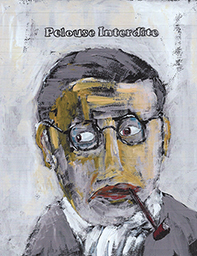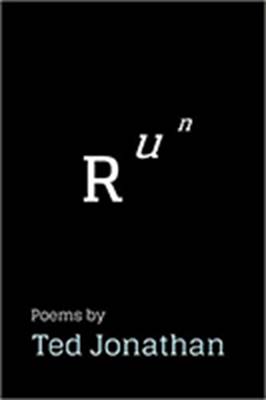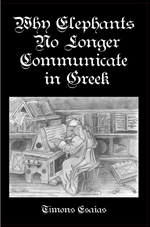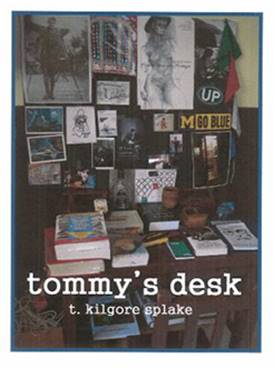 Books Received & Acknowledged
Books Received & Acknowledged
“To devote a life to poetry looks to most
people like a decision to ignore the benefits
of modern life, in particular the power of
money to effect any meaningful progress.
It looks suspiciously like sulking. I always
liked poetry, but I know that only a fraction
of 1 per cent of the population share my
interest and that even I, if I am honest, prefer
pop music. Have I chosen this little-liked
art form from fear, or from sloth? Fear of
the standards of the real world, or sloth of the
efforts they demand? Writing involves a certain
amount of life-denial and a lot of past-gazing.
This is considered immoral. Everyone knows
that the past is a decadent shade of mauve,
whereas the future is a virile orange.”
Hugo Williams, Poet, in the TLS 4-18-03
3 By Splake
Crossing Brautigan Creek, Rusty Truck Brown Bag Series #2, Rusty Truck Press, unpaged, npl, 2016.
Waiting, splake@chartemni.net, 42 pages, npl. 2016.
Tommy’s Desk, Presa Press, POB 792, Rockford, M.I. 49341 www.prespress.com, 64 pages, $13.95, 2016.
Crossing Brautigan Creek, literally, comes in a brown paper lunch bag. As might be expected, given the size and dimension of a sand bag, the chapbook is long and thin, but is neatly sewn, with a cool cover, suitable for stenciling. As with most Splake work, the poems are generally short, thin, and have staccato fragmentary lines, adding up to a concise, sparkling image. Splake is an inveterate hiker and has personal, sacred spaces, each bearing the name of one of his spiritual, poetic muses. In this case the reference needs no explanation. When the poet wanders into town, following his excursions, for his daily (morning strong coffee) “existentials” he sees a familiar world of empty lives; a fate he hopes to avoid. All of the poet’s recent efforts are a rush against time’s winged chariot drawing near (“rat bastard time”). He hopes to leaves something worthwhile behind and, as these poems show, he should have no worries on that score.
Waiting continues the spiritual journey of the poet. The cover shows an old fashioned, now increasingly rare, phone booth, with an actual push button phone. Given the state of the booth, the viewer would not expect the device to be functional. This is a Waiting for Godot in the UP; a mixture of the poet’s signature short poems and a concluding longer work, aptly named “Odyssey”.
Tommy’s Desk is the third of the Splake, one-man book of the month club, offerings for 2016. His desk is an orderly place, photos and decals above the work space of significant, creative others, ranging from Patti Smith to Richard Brautigan to Norbert Blei to Big Blue, the Michigan eleven college football team. Inside an examination of the poet’s life, from the graybeard he is now, to the younger man’s optimism, way back in the 50’s. In between, the .357 magnum for a terminal illness emergency. Splake/Smith’s sixth title with Presa is his latest winner from a press specializing in undervalued, mostly late in life, poets.Rich Ives, Light from a Small Brown Bird, The Bitter Oleander Press, www.bitteroleander.com,
82 pages, $14.00 2015Rich Ives, Sharpen, with illustrations by Jack Cahill and disarms by Nils Davey, NYPress, theNewerYork.com, 48 pages, 2015 $10.00
The poems in Light from a Small Brown Bird, has deep image poems, by which I mean much anthropomorphic vitalization of, objects and beings, in a metaphorical context. Or, simply put, these are poems where birds have qualities of humans, rocks speak, and the normal boundaries, the separation of man and nature, are largely eliminated. After while, the effect is like an extended dream sequence, or being locked inside a Cornell Box as one of the objects. While this may be disconcerting, it is also exciting, as the effect allows you to see the world in a completely different context; images are palpable, but as fluid as water.
i.e. 1951 North Dakota (quoted in full)
In the country of snails and blackbirds
the lives of waterbugs flicker over the surface.
Reflections shimmer and pull
on both sides of my eyes.I was searching for the place
I had lived in. I came to a path,
a small opening in the sadness.
I crawled in and the night
crawled in after me.
Even more disconcerting, is Sharpen, billed as a collection of 10 stories. Each one is a truncated page long, has an accompanying wild illustration, and a diagram, mostly for implements found in a large, home workshop. Why? Beats me. The immediate effect is of being locked in a woodshop in a dream with a girl child and puppets: each pieces disorients the dreamer, defies all standards of convention, and understanding. The overall effect is like Dadaist Art: found objects in a context which both locates and confuses the reader/viewer. The most lasting image is the ghost twin, the feeling of something you sense being there, but you can’t actually see it or touch it. Even the bios appear to be part of the text and a kind of story. As I flunked woodshop one marking period, I found this locked room to be a kind of recurring nightmare.
Will Nixon, Acrostic Woodstock, Bushwhack Books, www.bushwhackbooks.com., 86 pages, $12.95, 2015
I am on record as being turned off by gimmicks in poetry, but as I know Will, and trust his poetic judgment, I decided to give this a shot. And I am glad I did. Yes, there is an obvious gimmick: the first letter of each line, as you read down, forms a name of a person or a place, from Woodstock, New York, where the poet now lives and works. Unfamiliarity with the people and places is not a real problem, as Nixon makes each person and place, memorable and recognizable. Whether it be an elegy for a poet friend, or an appreciation of another, these acrostic poems are lively, entertaining and satisfying as poems. This handsome book is lavishly illustrated by Carol Zallom’s linoleum cut prints.
Kristine Ong Muslim, Age of Blight, Unnamed Press, www.unnamedpress.com, 105 pages, $14.00, 2016
Ong Muslim’s book is a collection of short stories that purports to be of fantastic nature, the way good science fiction used to be back in the middle of the last century. I initially told her I would not review the book, though it sounded up my alley. Instead, I bought the book and here we are.
I was initially impressed by the warning in the author’s Preface, “Notes on Places in this Book”,“All these places are familiar, and you may have been in some of them-or all of them. And if they don’t seem familiar, it is likely you aren’t paying much attention.”Her fictive world Is oddly familiar, as the intent of her book is satirize, to describe, through familiar traits, human foibles, as it were, and politics. People are venal, self-interested, inherently stupid, and grotesque, dedicated to making the worst possible choices.
The early stories are concerned with seminal psychological experiments on monkeys imprinting with artificial mothers, as seen from the point of view of the artificial mothers. These are told in a matter of fact, almost clinical tone, that makes them all the more eerie as they are rooted in Fact. Scientists or sadists, these stories ask? It is obvious which side she is on.
There is nothing pretty in this world, a quick glance at the “Zombie Sister” will prove that as no one in this world completely dies, they just, well, slow down, and need less stuff and get more grotesque as they age into their new state as a non-living being. “The Quarantine Tank” is a telling example of how corporate and political interest intertwine, “invade” a country by infiltrating an unspoiled place, offer them “improvements”, at the cost of slowly destroying their world, with the overall goal to exploit their natural resources. The new powers-that-be have an idea to camouflage their work: a lavender field is allowed to flourish outside a chemical plant as an example of how nature survives (despite itself) while progress is made. Progress is made all right; monetizing and capitalizing, while the world around it is destroyed, leaving only lavender scented chemical waste behind.
Age of Blight is the kind of book that challenges the reader to look at the world and see how what she describes applies to where he or she is now. Ong Muslim lives and works in the Philippines, edits a magazine, and is a well-regarded poet (though I have not seen her work, her resume speaks for itself) and a writer of speculative fiction, whatever that is these days, who deserves a large, international audience.Ted Jonathan, Run, NYQ Books, ww.nyq.org, 91 pages, $14.95, 2016.

Make no mistake about it, Ted Jonathan’s book is at urban book, a New York book, using the landscape where he grew up and works, as the place, and themes, for his in–your-face, gritty poems. As most kids born and raised in the City, Ted’s formative education, and early years, were basically rootless and disorganized. He finds himself copping drugs in Washington Square Park, watching TV and sipping Heineken, dropping downers to get through another day in a dead end job, in a life that seems without purpose, or meaningful direction. Then William Packard happened. In his poetry class Ted sees someone who takes no bullshit, who is immune to idolatry, and hero worship, the rare, not ego driven, well known poet/teacher, someone who gives Jonathan a chance to “get it right. The tribute poem “Tractus” is at the heart of Jonathan’s search and development as a poet. Along the way we meet all kinds of urban cheaters, wild deluded women, perverted brother and sister teams, street crazies and dimestore prophets, who haunt the subways and buses of our urban American nightmare. This is no dream landscape but a real life Odyssey by a poet on top of his game.Raymond Keen, The Private and Public Life of King Able: a play in three scenes, Create Space, 26 pages, $8.99 in print from Amazon, also available in a digital format.
This remarkable short play thoroughly entices the reader. An older, but still spry and alert seeming king, is sitting on a throne in full royal regalia. At his back, to his right, is a wading pool, and at his feet, a CD player. The king is holding the player’s remote as he begins to speak. He addresses remarks to an unseen audience, pauses, waits for a reply but hears nothing. Gradually you become aware that this is a monarch without a kingdom, the speech addressed to people, largely in his imagination and memory. The only response to his speech, realistically, will be one that is self-generated from the tape recording.
In a mere few pages, Keen has conjured a setting and situations that recall Samuel Beckett, that channel “King Lear”, and has stage directions by the Dadaist, Alfred Jarry. Is this “Krapp’s Last Tape”? Or is this a Shakespeare knockoff? “Ubu Rex” or a Lost Elizabethan History play found on the other side of Alice’s Looking Glass? The only way to find out is to read on and decide for yourself.
I contend it is all of these and much more. In the second scene, silent masked men dressed in white lab coats, like guards, or attendants, appear. Now we are in the territory of Peter Weiss’s Marat/Sade and the poetics of madness and totalitarian politics. As in Weiss, the madhouse is a metaphor for society on the whole, and the rulers in hell are not only dispossessed but clinically insane.Simply reading a play and visualizing the narrative without the expressive cues, is challenging, as seeing what is written expands what is said. On the page, intonation, gestures, expressions can only be inferred. Still what is on the page is a remarkable achievement. Keen takes great pains to create a viable, visual narrative that makes the reader yearn to see the play live.
In particular, as with Beckett’s plays, it is difficult to see the potential humor in the words, until you see how the author/director’s intentions are fully realized on stage. I suspect there is more humor involved here than the ominous setting and situations suggest. As with Beckett, as we near the end of civilization, of life, we must laugh, because life is absurd and absurdity is, or can be, extremely funny. The way black humor is funny. You are either king or you’re not. You either go on or you don’t. You either laugh or you cry. It makes no difference in the end. King Able would understand.
Charlie Rossiter, Lakeside Poems, Foothills Publishing, www.foothillspublishing.com, 55pages, $12.00, 2016
Probably the best description of the book is offered by the author in his one paragraph introduction to these brief, finely wrought, contemplative poems,
“There are forty-seven distinct poems here, reflecting
varied moods, feelings and experiences. On the other hand, the entire series could also be viewed as a single. long, multi-part love poem to Lake Michigan, many years in the making.”None of these poems are more than twelve lines long and all reflect Rossiter’s ongoing interest in classic Chinese poetry. While they are brief, there is a wide range of emotions expressed, all reflecting the joy of living in the moment, on the shores of Lake Michigan and, well, anywhere at all.
41.
Some folks think
my life’s not exciting
but they don’t understand.
Each day the lake’s a new color.
No two sunsets are the same.
Timons Esaias, When Elephants No Longer Communicate in Greek, Concrete Wolf, ConcreteWolf.com, 150 pages, 2016, $15

The press release for When Elephants No Longer Communicate in Greek, inform the reader that this title is the inaugural volume of a poet’s, over 50 years of age, series of books chosen from manuscripts sent to a contest meeting those criteria. So if you missed your big opportunity to win the Yale Series of Younger Poets (poets under 40) and missed out at Passager and Autumn House Prize publication, two other presses who publish the older poets exclusively, here is another chance for you.
Esaias shows why he is deserving winner of this award in a wide range of witty, erudite, informative and downright clever, fun poems. He is capable of a deep discourse on philosophical writing and mocking the same kind of discourse; a quality often lacking in working poets. Make no mistake about it, all kidding aside, Esaias is a serious poet and damn fine one at that. This is a book for all readers, young, old and in between ages and interests.
Dah, The Translator, Transcendent Zero Press, transcendentzeropress.org, 110 pages, 2015, npl.I am at a loss on how to respond to this book for one simple reason: this is writing that is just not my cup of tea. I was put off by the pretentious, academic Foreword, that seemed more like an exercise in the use of jargon at the expense of clarity, or of someone with nothing to say, or, more precisely, too much of nothing to say. If pressed to summarize this book, as briefly as possible, I would say it is a philosophical work, told in poetry, using Nature as a metaphor, and as a key to understanding a larger spiritual existence, with surrealistic overtones. Certainly there is an audience for The Translator, it just isn’t me. Regardless, skip the Foreword.
Laurel Speer, Why Are You Living in This Low-Rent Apartment? Available from the author at P. O. Box 12220, Tucson, Az., 85732-2220, 18 pages, 2016, $4.
Speer’s latest, in an ongoing series of annual publications, is a delicious, witty, irony filled compilation of prose poems about apartment dwelling. Suffice to say, the places she inhabits would be perfect were it not of the neighbors, the landlord, and the accommodations. Especially the neighbors. Anyone who has had to live in an apartment complex will surely identify. Think of your place of employment as an analogy: the job would be great if it weren’t for most of the people you worked with, the managers, owners, and the public you had to deal with. That considered, the job isn’t so great. Neither is apartment living. Well worth the modest price.
Are you a wiseass? Well, I guess I am because I have a poem in the new anthology edited by Jerry Bradley and Ulf Kitchdorfer, The Great American Wise Ass Poetry Anthology published
by Lamar University Literary Press, www.lamar.edu/literary Press, 2016. 200 pages of snarky, flippant, flip off poems, ranging from scatological rude to in-your-face- crude. Something for everyone. If you thought University Presses did nothing but staid, academic books on worn out themes, think again. This book is for you. Price listed on Amazon is 18.17. I think the original price is $19.95.Lantern Lit, Vol. 3, dogonachainpress@yahoo.com. 2016, unpaged, roughly 60 pages. No price listed either, 2016. All work was solicited by editor Beasley Barrenton. This is a neat, compact, glossy format, compilation featuring three diverse poetic voices. I was privileged to be one of those poets offering pieces that seemed to be about something they are not actually about, (see the Russian poems) among other more conventional poems. The other two poets, both from North Carolina, were both unfamiliar to me. William Graham offered some lean, approachable personal poems contemplating large Life issues in a clear, Everyman voice. Mat Gould’s poems were also compact, but much more abstract in language that is “subtly apocalyptic”. I’m not sure what that means exactly, but they are abstruse and elusive in both language and meaning.
